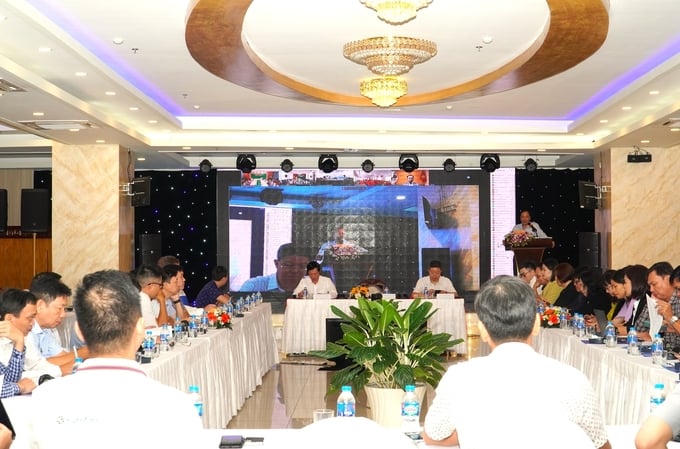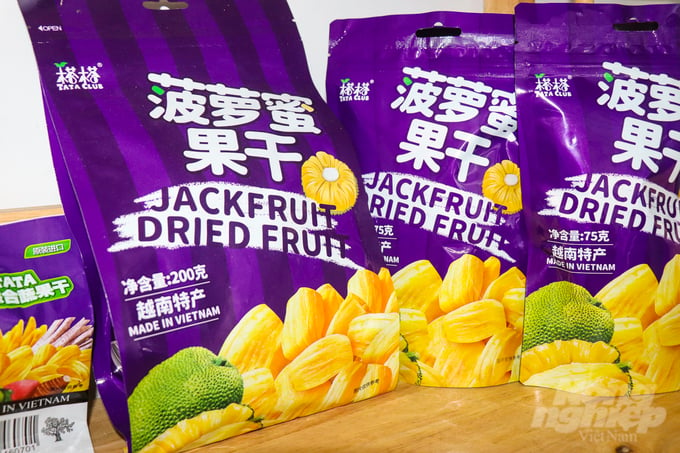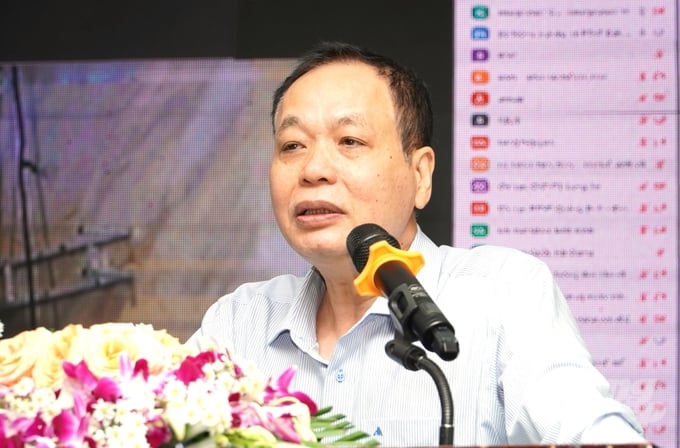June 21, 2025 | 00:56 GMT +7
June 21, 2025 | 00:56 GMT +7
Hotline: 0913.378.918
June 21, 2025 | 00:56 GMT +7
Hotline: 0913.378.918
The Mekong Delta region as well as Vietnam as a whole, are actively promoting the export of agriculture and aquacultural products to numerous countries around the world. Notably, the East Asian region has emerged as a significant market with significant potential for Vietnam to increase its exports.
East Asia is a traditional and central export market for Vietnamese products. Accordingly, Vietnamese agricultural products have marked their first exports to this region.

Roundtable discussion on "Connecting information on demand, consumer trends, and market regulations for agricultural products in the East Asian region" was held on November 10 in Can Tho city. Photo: Kim Anh.
With the aim of assisting producers, processing businesses, and traders in obtaining market connectivity information, the Department of Quality, Processing, and Market Development under the Ministry of Agriculture and Rural Development, collaborated with the Department of Asian-African Markets under the Ministry of Industry and Trade, and Can Tho city's Department of Agriculture and Rural Development to organize a roundtable discussion on "Connecting information on demand, consumer trends, and market regulations for agricultural products in the East Asian region" on November 10.
The East Asian region, including Northeast Asia and Southeast Asia, is an important export target market for various Vietnamese agricultural products such as rice, seafood, fruits, cassava and cassava-based products, rubber, etc.
Vietnam currently has three major trading partners within the Northeast Asian region: China, South Korea, and Japan, which account for 48% of Vietnam's total import-export value with the world. These three countries, with a combined population of 1.6 billion people, have high average incomes and strong consumer spending. Mr. Nguyen Duy Kien from the Department of Asian-African Markets, evaluated that this market holds significant potential for Vietnam to further promote the export of high-quality products.
According to Mr. Kien's analysis, after the Covid-19 pandemic and recent political instability, the dynamics of trade exchange between Vietnam and other countries around the world have undergone considerable changes. Several agricultural products have experienced rapid growth, whereas aquacultural products have developed slowly. As a result, the exchange and sharing of information and future development directions are crucial.

The Northeast Asian region holds significant potential for Vietnamese businesses to increase their exports. Photo: Kim Anh.
Vietnam is making an effort to expand its market range and actively engage in bilateral and multilateral trade agreement negotiations. Namely, Vietnam is a pioneer in participating in trade agreements with China, South Korea, and Japan. The resulting agreements have brought substantial benefits in terms of tariffs and market access for Vietnamese businesses, with a focus on strong sectors such as agricultural and aquacultural products.
The trade turnover between Vietnam and the Northeast Asian region reached 236 billion USD in the first nine months of 2023. Accordingly, the export turnover of Vietnamese agricultural, forestry, and aquacultural products reached 10 billion USD, marking an increase of 14.2% and accounting for 11.3% of Vietnam's total export turnover to the Northeast Asian market. This category of Vietnamese export products currently holds a market share of 3 to 4.8% in China, South Korea, and Japan. Consequently, Mr. Kien emphasized the need for Vietnam to continue promoting the underutilized potential for exports to these countries.
Regarding trade development for agricultural and aquacultural products in the Chinese market, businesses should focus on accessing markets in the provinces of Guangdong, Guangxi, Jiangxi, and Fujian. Vietnamese businesses have traditionally favored exporting goods to the border provinces of China. However, the market in the North and East of China also holds considerable potential for export, with a purchasing power of up to 400 million people distributed across the medium and high-income group, who are willing to purchase high-quality goods and products. Nevertheless, the majority of Vietnamese products have failed to access and utilize this market.

Vietnam's export of agricultural and aquacultural products to the Northeast Asian region in the first nine months of 2023 increased by 14.2% compared to the same period 2022, primarily driven by a significant rise in exports to China. Photo: Kim Anh.
Various countries within the Northeast Asian market are currently imposing a new set of import standards. Accordingly, China is reinforcing the management of imported agricultural and aquacultural products, the inspection of packaging, labels, and source traceability; South Korea is implementing a pesticide management system, strengthening quarantine measures; Japan is enhancing inspection procedures.
Accordingly, Mr. Kien suggested Vietnamese businesses to research information in response to new standards and consumer trends in the export market. On the other hand, they should maintain market share by utilizing tax benefits under Free Trade Agreements. Businesses should enhance trade promotion, establish commercial connections, and actively participate in large distribution systems in Northeast Asian countries. Additionally, exporters should consider leveraging cross-border e-commerce.
The Department also recommended businesses to pay attention to customs duty policies with regards to to China's Orders No. 248 and No. 249 to ensure the completion of all required documents and paperwork when exporting agricultural and aquacultural products to the Chinese market.
Regarding the South Korean and Japanese markets, Vietnamese businesses need to shift their focus towards maintaining a reputation for food safety standards in exported agricultural and aquacultural.

Mr. Nguyen Nhu Tiep, Director of the Department of Quality, Processing, and Market Development, recommended Vietnamese businesses to develop a transparent, responsible, and sustainable agricultural sector in accordance with international standards. Photo: Kim Anh.
Vietnam is a leading export country with products present in over 180 countries and territories globally. With the aim of maintaining this position, Mr. Nguyen Nhu Tiep, Director of the Department of Quality, Processing, and Market Development, emphasized that Vietnamese businesses must produce in accordance with market signals, and understand international consumers' demands with regards to quantity, type, quality, and utility. In addition, it is essential to develop a transparent, responsible, and sustainable agricultural sector in accordance with international standards.
Translated by Nguyen Hai Long
![Turning wind and rain into action: [9] Digitizing hydrometeorological data in response to climate change](https://t.ex-cdn.com/nongnghiepmoitruong.vn/608w/files/news/2025/06/17/z6704423696987_15fd32ffc26d590d204d520c9dac6786-nongnghiep-165943.jpg)
(VAN) Farmers have begun accessing hydrometeorological applications to adjust their cropping schedules, aiming to ensure productivity and adapt to climate change.
![Turning wind and rain into action: [8] Real-time salinity detection and early warning technology](https://t.ex-cdn.com/nongnghiepmoitruong.vn/608w/files/news/2025/06/17/z6704423696987_15fd32ffc26d590d204d520c9dac6786-nongnghiep-151127.jpg)
(VAN) Thanks to the integration of modern hydrological-hydraulic models, remote sensing technologies, and artificial intelligence, the accuracy of hydrological forecasting has significantly improved.
![Turning wind and rain into action: [7] Early disaster warnings help marine farmers minimize losses](https://t.ex-cdn.com/nongnghiepmoitruong.vn/608w/files/news/2025/06/17/z6704423696987_15fd32ffc26d590d204d520c9dac6786-nongnghiep-142942.jpg)
(VAN) In recent years, thanks to early disaster warnings and forecasting, marine farmers in Khanh Hoa province have been able to reduce risks and losses, thereby improving production efficiency.
![Turning wind and rain into action: [6] ‘Four on-the-spot’ disaster management software](https://t.ex-cdn.com/nongnghiepmoitruong.vn/608w/files/news/2025/06/17/e5a48259d6a262fc3bb3-nongnghiep-183800.jpg)
(VAN) By simply activating the scenario on the disaster management software, the relevant authorities immediately know how many households need to be evacuated, where to evacuate them to, and by what means of transportation…
![Turning wind and rain into action: [5] Hue applies modern technology in disaster forecasting](https://t.ex-cdn.com/nongnghiepmoitruong.vn/608w/files/news/2025/06/17/z6704423696987_15fd32ffc26d590d204d520c9dac6786-nongnghiep-093938.jpg)
(VAN) In Hue city, modern technology has recently been applied in meteorological and hydrological forecasting and warning, helping to reduce the damage caused by natural disasters.

(VAN) A cutting-edge farming technique being implemented on an experimental ranch in Arizona's Sonoran Desert has already saved a billion gallons of water over five years, according to Civil Eats.

(VAN) Poultry and pig production and the environment can be boosted through enhanced water technology, according to new research.